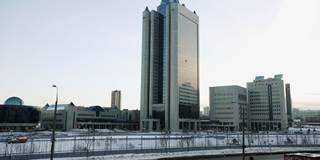
How Russia Stays Afloat
The long-term sustainability of Russia’s economy is an open question: cronyism is rife, and Russia’s heavy dependence on oil revenues means that it will suffer whenever oil prices fall. But if the Soviet Union taught us anything, it is that unsustainable systems can survive for many years.
WASHINGTON, DC – The long-term sustainability of Russia’s economy is an open question. Cronyism is rife, and Russia’s heavy dependence on oil revenues means that it will suffer whenever oil prices are low. But if the Soviet Union taught us anything, it is that unsustainable systems can survive for many years.